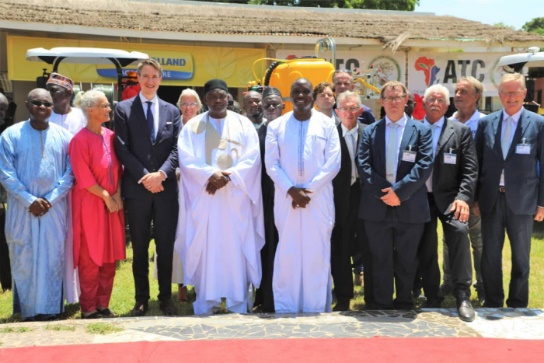
The ball will be set rolling next month for the implementation of GGC’s Smart Farming Project.
The brainchild and one of the pet projects of His Excellency, President Adama Barrow, the Smart Farming Project will be implemented by the National Food Security, Processing, and Marketing Corporation (NFSPMC) in partnership with TIJMS Trading International Joint Venture.
The expectation is that the project will set the Gambia’s decades-long unproductive farming system on a trajectory of advancement that would offer Gambian farmers limitless dividends.
As the global farming community grapples with numerous food safety challenges such as standard pest control, vagaries of the weather, and contamination that lead to many diseases that harm human health and negatively impact the credibility of food producers and manufacturers as they export food products, smart farming solutions can shift the narrative by transforming the way the entire agri-food supply chain is managed as food supply chain gets more complex amidst tough local and international food safety regulations.

Cognizant of these challenges and the realities of the global food chain, His Excellency, President AdamaBarrow and NFSPMC Managing Director, Mr. Muhammed Njie, introduced the first-ever smart farming technology initiative in The Gambia through the Gambia government’s transformative agenda.
Meanwhile, Mr. Muhammed Njie is credited for injecting a new lease of life into the hitherto moribund GGC. He took over the GGC at one of the most critical phases of the corporation, which was in a coma for many years. But with tenacity, vision, perseverance, and a burning desire to turn its fortunes around, Njie succeeded in transforming the GGC into one of the most vibrant government institutions within a relatively short period of time.

One of his brilliant initiatives, the Smart Farming Project was launched last month by the Gambian leader himself and the raison detre is to change the face of the country’s agriculture sector. A scintillating array of senior government functionaries, agricultural workers, and members of the farming community graced the event with their presence to be part of history. The excitement that greeted the launch of the Gambia’s first-ever Smart Farming Project was unmistakeably genuine as it followed several years of preparation and long wait.
The excitement at the launch was encapsulated by the President of the Gambia Farmers Association, Alhagie Ceesay, who said the GGC boss has succeeded in bridging the gap between farmers, his office, and the government.
In his speech at the launch in Banjul, President Barrow said the project should be seen by heads of public institutions as an example of forward-thinking approaches and innovative development.

“Thus, our partnerships ought to be mutually beneficial and aligned with the realities of the people. In the same way, our projects should always be inclusive and multi-faceted enough to effectively solve the growing challenges of our growing youthful population,” the President underlined.
A delighted President Barrow added that the success of the project will “surely” lead to a decrease in youth unemployment.

“It is a bold step towards food self-sufficiency and will contribute to increased GDP and foreign exchange earnings. It is convincing that, with unity and such support, The Gambia would eventually become a beacon of hope and glory. We can demonstrate how a nation can achieve great things when a people stand together under one unified vision: unified in purpose, unified in strength, and unified in development,” the President said.
The Managing Director of NFSPMC the introduction of the project stemmed from the corporation’s acknowledgment of the need to delve further into the agricultural production value-chain with the view to guaranteeing quality and quantity of produce from the grassroots as well as his institution’s cognizance of its mandate and appreciation of the challenges they and The Gambia face as an institution and as a country, respectively.
“To be able to compete with international traders in a fast-evolving industry, there is an urgent need to reinvent our processes locally, develop value-added products, and build the right network to market those products at an optimal level. To do this, after looking at all viable options at our disposal, we found the right partner in TIJMS Trading International,” the GGC boss recognized.
He revealed that the ground-breaking project involves a fully functional smart farming concept for 25 communities complete with solar-powered and GPS-controlled drip irrigation systems, agricultural mechanization equipment, a full-service repair and maintenance facility for equipment, vehicles, and machinery, and the installation of state-of-the-art solar-powered cold storage facilities for storage and processing of produce for export.
“This innovative solution targets a minimum of seven Sustainable Development Goals, ranging from zero hunger to poverty reduction and climate action, amongst others. The Corporation believes that, while it is our responsibility to contribute to our national GDP, it is equally essential that we contribute towards strengthening the resilience of the most vulnerable in our communities as a social enterprise,” he said.
Mr. Njie expressed the resolve that the smart farming project is one of the many projects that his corporation will be embarking upon.

“Our current position has seen the strengthening of our trading arm, which has been a good price stabilizer in the market. As a commercial entity, we are in business to make a profit and to contribute to the government’s development agenda. It is, however, worthy to reiterate that, as a social enterprise, we have very unique obligations to the Gambian people that can never be ignored.”
The development of the project, he disclosed, came after immense scrutiny of its viability and sustainability.
“As the first of many such projects planned for the next five years, it is important to us that it succeeds in every way we have envisioned. We believe strongly that this multi-million-euro project will not only be a commercial success but will inevitably improve the capacity of our people in one of the most essential industries in modern times,” he noted.
He expressed profound appreciation to President Barrow for his immense support in assisting them in the development agenda.
“The corporation expresses similar sentiments to the ministers of finance and agriculture for their readiness to respond to our strategies and plans and to provide the necessary assistance at all times. In the exercise of our mandate, we continue to assure the government of our resolve to provide innovative solutions to our industry challenges and look forward to the continued and relentless support from the government at all times,” Mr. Njie stated.
What is Smart Farming?
Smart farming focuses on managing farms, plantations, and all associated farming activities using IoT, drones, robotics, machinery, and artificial intelligence to determine a path to predictable farm output.
Smart farming is also focused on the use of data acquired through various sources (historical, geographical, and instrumental) in the management of farm activities.

Differences Between Traditional and Smart Farming Techniques
Smart farming techniques bring several benefits over conventional farming strategies. Some of these include exercising increased control over production processes, which in turn enhances cost management and reduces waste generation. In addition to this, smart farming, through the implementation of new technology in agriculture, makes it easier to trace anomalies in crop growth as well as livestock health.





